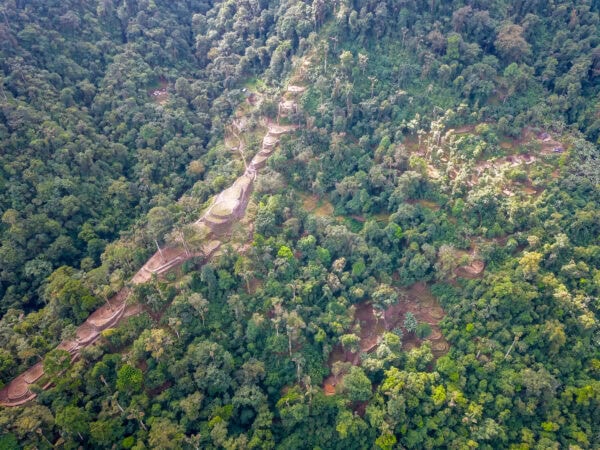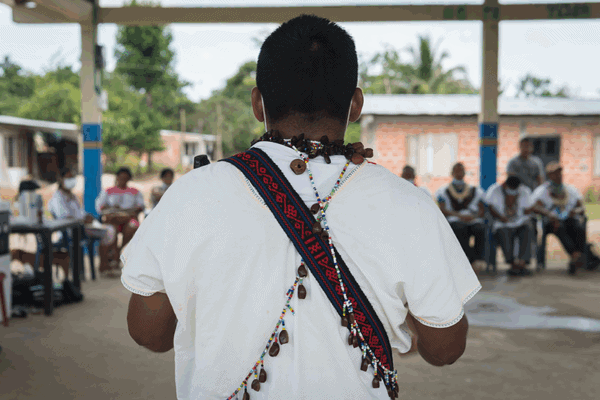Imagine that you live in a rainforest many hours from the nearest city. You are very poor, and life is precarious. A parade of soldiers, drug dealers, gangsters, and fortune hunters comes through the village from time to time. They take what they want. You can’t stop them, and no one comes to help you.
One day, a man from the government comes and hands you the keys to your land, and says, “Here’s the forest, here’s the river, here are the animals, the plants, the fruits, the fish, the birds, everything on it – it’s yours. It’s now your job to protect it and manage it. That’s what you wanted, right? Good luck!”
The Uitoto people live in reserves along the Caquetá River. A hundred years ago, their ancestors ran for their lives into this remote region of southern Colombia, fleeing the depraved rubber barons who built their empires on slavery and atrocity. Barely a handful of this once numerous people survive. As their elders die, memories of the culture that once guided and sustained them also fade.
We have worked alongside the Uitoto since 2013, when plans were negotiated, in conjunction with the Colombian National Land Agency, to expand their reserves. As part of that process, we guided the communities in the construction of an Environmental Management Plan, one of the requirements for expansion. It was a struggle for everyone involved. The processes of western governments were both alien and mysterious to the tribal people’s ways. Though the people wanted control of their lands, they lacked basic skills in management. Even the rainforest terrain magnified their difficulties: the widely scattered settlements were difficult to govern and in conflict over resources. We all worried that if these weaknesses could not be overcome, the reserves would remain vulnerable to destructive pressures from without and within.
Thanks to the generosity of the Skoll Foundation and its unwavering support, we embarked on an ambitious program to bring college-level governance and management training to members of the reserves. We called it “Empowering the Autonomous Management of Indigenous Territories in Caquetá, Colombia.”
In February of 2016, we began by sponsoring gatherings across the far-flung settlements; men and women, elders and youths, local leaders, and community organizations participated. We asked each other: what is needed for the reserves’ future? In western terms, we planned and programmed. In indigenous terms, we formed visions and then worked out how to realize them.
Once we identified our goals, we assembled our team of expert trainers, whom we—in turn—
coached on the realities of indigenous cultures. Three sessions of around thirty hours each were planned. Forty-two people signed up to attend the trainings.

BUSINESS SCHOOL IN THE RAINFOREST
In the long, hot, equatorial afternoons, the waters of the Caquetá appear golden in the sun. A simple building in a small village sits back from the banks. Inside, a bearded man from Bogotá stands before a group of students, who sit on backless benches and listen intently as he talks to them about concepts such as the commons, agreements and rules, and the wellbeing of the community. The man is Dean of Economics from the prestigious University of the Andes, and he is clearly energized by the creative challenges of teaching his indigenous students. As he builds conceptual bridges across the cultural divide that separates his world from theirs, the eyes of his students flicker with a growing understanding.
For the next module, two women from the Colombian National Planning Department train the participants in financial management and investment concepts. If the reserve is able to demonstrate sufficient skill in managing money, it can be designated a “territorial entity” and the community can apply for public funding directly from the national government.
As the last module unfolds, the students learn to imagine what they can do with those funds. Two men from Sinergias, a Colombian nonprofit, walk the students through the different steps involved in formulating projects and then carrying them through to completion. The men and women in the classroom seem to grow more solid where they sit, more clear in their minds. For a people who have long struggled on the edge of survival, this kind of education is an extraordinary gift of power. They will not waste it.
THE DREAM IS REAL
It cannot be overstated that many indigenous people of the Amazon have been trapped in a nightmare not of their making. The Uitoto escaped the horrors of the rubber boom but landed directly in the crossfire of armed conflicts. Nearly invisible to their distant and besieged national government, the communities grew more fragile as trauma piled on trauma.
Within indigenous traditions, the act of reflection occupies an honored position. Reflection is part of the communal process through which a people determine their tribe’s destiny; their thoughts, desires, and beliefs are openly discussed until a path into the future appears. The whole community must decide to walk down that path, together. The Uitoto forged a dream of autonomy, but the path was quicksand. Now, after the training, the ground before them is solid.
There is more work to do. Indigenous peoples, upon reflection, place themselves within the intricate web of Nature and mold themselves to her laws. The participants in the training see themselves as part of a larger movement; they are like small springs rising out of the ground, which join to form streams, and then tributaries, and then flow as a great river inevitably, powerfully, towards the sea. They want to continue the program, to increase their skills, and also to share it with other indigenous communities. They want to work with us to establish La Escuela del Rio, the River School. It will empower local communities all across the Amazon to take control of their destinies, to partner with their governments, and to protect and manage their extraordinary forests and lands for the wellbeing of us all.
The River School is an audacious goal, but it is not ephemeral. This time, the dream is real.
Share this post
Bring awareness to our projects and mission by sharing this post with your friends.




